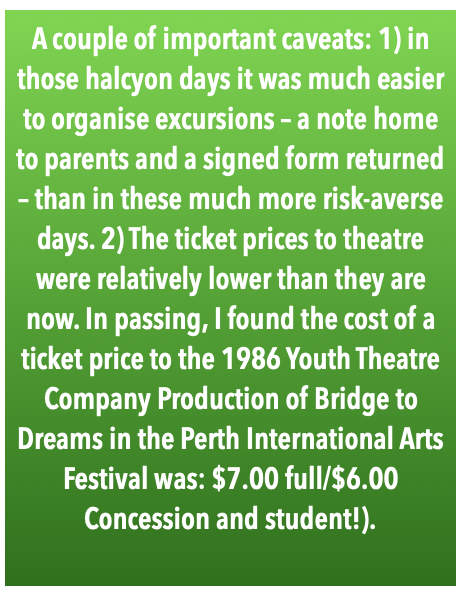Foreman Funnies - Some thoughts about school productions...
/……and building a theatre culture in a school.
We took the bold step of including a Theatre Excursions Fee on Booklist (arguing that as there wasn’t a textbook, it was a reasonable ask). Students then opted to draw down on this account when they chose to join the excursion. The fee was set to allow for two or three productions.
So, onto the school bus (and sometimes our cars) students would pile. Thankfully, we could call on other teachers (like Dave) who had a bus license. While mostly we focused on the productions in Perth International Arts Festival, we also took students to see productions in nearby schools and also the local amateur and community theatre groups.
If you want to learn drama (and teach drama) you need to experience drama.
The spin offs from seeing theatre were many. Seeing professional theatre encouraged us to inject a stronger sense of expectation in our productions.
Performance seasons ran for two weeks
By the following year, 1986 we played our productions Wednesday to Saturday for two weeks after having run only a single week in the first year. The two week runs continued until I left the school in 1989. And the first four shows were originals or original adaptations.
We loved giving the students the experience of backing up their productions for a second week. It gave them a hint of ‘professional’ theatre. And playing Wednesday to Saturday meant many of the cast had to negotiate with late night shopping employers for evenings off. (Sometimes a note on school letterhead helped.) This was yet another life skill the students needed to develop.
Casts learnt the different moods of crowds: Wednesday – quiet, I have work in the morning, Thursday – damn, I should be doing the weekly shop, Friday – starting to relax for the weekend, and Saturday – letting go, let’s party. And for the earlier days in the run they knew they had to work harder.
They learned the importance of a ‘laugher’ in the audience. You always want that one person in the audience who gets the jokes and laughs loudly. It gives everyone else permission to let go. I loved one of the cleaners at City Beach. She got EVERY one of my stupid jokes and roared with laughter every time.
Why productions are important
For drama students being in a production is sometimes as important – and often times more important – as classwork.
Speaking of City Beach, we did an Upper School Drama production each year and a Year 10 Panto (where roles were included for students who didn’t get into the class because of class size limits (there was always some kids hanging round rehearsals even though they couldn’t get into the enrolled class. And we included the odd ex-student as well in performance roles). Several years, in addition, we managed a whole school production.
Very few of these were ‘mainstream’ plays, over half were originals, but we always had audiences.
What sorts of productions
In an earlier post, Robin Pascoe wrote about the approachability of Broadway Junior shows. And I agree, they have lots to recommend them. They have become the staple of the Specialist Performing Arts program at Wanneroo Secondary College. They provide excellent challenges for the students.
The ‘plus’ is that once they reach Year 11 & 12 Drama, they are then in a position to then attack more broader works, some of them devised.
The one thing that schools have lost is the ‘Whole School Production’. There are always students who don’t take Drama for any number of reasons; timetable clashes, pathways, parental reticence… and the Whole School Production gives them an outlet to participate.
Mind you, in a program like that at Wanneroo, with up to 12 productions a year – Dance, Drama, Music – where in the world would they be able to fit in a whole school production?







